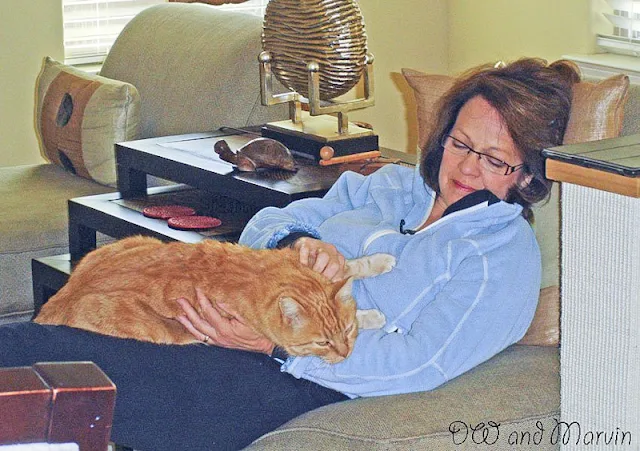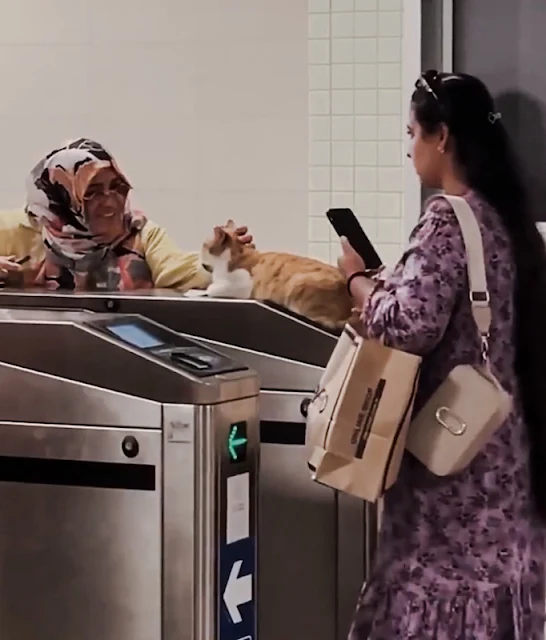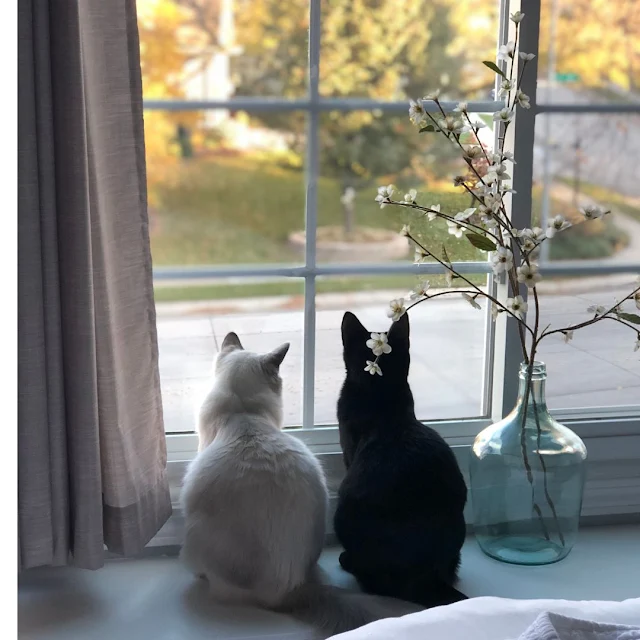 |
| A simple example of enriching the cat's environment by a friend's husband who lives in the US. |
A person on social media asked the above question. Another asked a very similar question: "How do cats stand staying inside their whole life?"
The questions go to that eternal debate about the necessity - it is believed by many - to keep domestic cats indoors full-time for their safety, for their owner's peace of mind and to protect wildlife.
Many more people are keeping their cats indoors full-time nowadays than in the past. If you go back far enough into the past, nobody kept their cat inside full-time. And in certain parts of the world, most domestic cat are community cats. They mingle between different owners. It is a very were loose relationship and they are all outdoor cats.
Cat domestication is still on a journey which started 10,000 years ago. It's evolving and it will be very different in 10,000 years' time.
I suspect that in 10,000 years' time all domestic cats will be full-time indoor cats. And I hope at that time cat owners will have done something about a major failing that is apparent to me nowadays.
This is that you can't just keep cats indoors full-time by locking the doors and windows on them. You can do that but if your cat is used to going outside, they will be unhappy. They will be confused.
But if you raise a kitten from scratch i.e. as a newborn and they begin their life indoors and they remain indoors it is more likely that they will be happy staying indoors all their lives. That's because of the obvious reason that they only know life indoors. That is their world.
So, the starting point is important. And equally important is how enjoyable you make the indoors for your cat. You must have heard the phrase "environmental enrichment". If you haven't it means converting the inside of your home to be equally suitable for humans and cats!
 |
| This is how the indoors should be for full-time indoor cats! Very few cat caregivers go this far. The words in the image are those of the constructor of the cat runs. Image in the public domain. |
Very few people do that by which I mean making it equally good for both species. But some people do make the interior of their home more interesting for their cat companion. This would include variously:
- Providing lots of climbing materials such as cat trees, some of which might go to the ceiling;
- Providing cat runs which traverse the walls and go up to the ceiling!
- Providing little hidey-hole places where they can hide and sleep. They should be high up sometimes where they will feel more secure.
- Providing toys to play with and then playing with your cat frequently.
- Building a catio, which is a small enclosure attached to the home with a wire grill to the exterior so the cat can smell and see the exterior more easily. They can employ their senses to pick up all that is going on in the exterior.
Cats need to be able to travel vertically as well as horizontally. They need a den the sleeping which is covered. Cats like something over their heads when they sleep ideally. That is not an absolute requirement but it's a good recommendation.
So, the answer to the question is you can keep cats indoors full-time but there is an added obligation on the owner to make sure that their cat does not become bored. There are tens of millions of very bored full-time indoor cats in America and elsewhere. And they end up pleasure eating to relieve the boredom which leads to obesity which in turn leads to illnesses such as feline diabetes.
When people say their indoor cat sleeps all the time, it is no surprise to me because they have nothing else to do. They are not actually in deep sleep. They are simply snoozing, killing time, resting and zoning out. It is incumbent upon cat owners to really rise to this very difficult challenge of enriching their cat's environment if they are confined to it.
When they do it is not bad to keep a cat indoors all the time. If they don't rise to the challenge, it is bad! It is down to the caregiver to make it work. Thus far I have not seen enough - anywhere near enough - commitment to enriching a cat's indoor environment.
There are some secondary issues which are perhaps obvious. It's much easier for a full-time indoor cat to live in a big house with many rooms. Lots more space. It's much harder for a cat to live in a bedsit in a high-rise apartment block. It's much harder to make the latter environment enriched compared to the former.
And also, there's the question of how often the owner is around. I believe that it's important that the caregiver is around a lot to ensure that the indoor cat is entertained. Perhaps I'm being too demanding and expecting to high a standard. But this goes back to the original issue about the added responsibility placed upon the caregiver of full-time indoor cats.











.jpg)

















